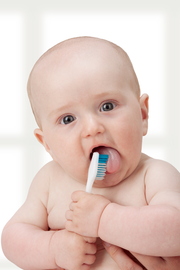Everything a Parent Should Know About Baby Teeth and Child Dentistry
As a parent, you should be aware of the proper care of your baby’s teeth. From the moment that first tooth appears until they start to lose their baby teeth, parents need to know how to keep those pearly whites healthy and strong. From brushing techniques to preventing cavities, there is much that needs to be done for children’s dental health to remain at its best.
We’ll discuss everything a parent should know about baby teeth maintenance – from teething pains and bottle decay to losing those precious milk teeth! Read on for more information about caring for your child’s smile during these crucial early years!
When Should I Start Brushing My Baby’s Teeth?
As soon as your baby’s teeth erupt, you should start brushing them. They can become used to the sensation of having anything inside their mouth by simply cleaning the surfaces of their gums with a moist cloth. Use a soft-bristled children’s toothbrush and fluoride-free toothpaste as soon as the first tooth erupts (no larger than a grain of rice). You must clean their teeth twice a day for two minutes each, in the morning and at night. Did you know that 35% of toddlers experience primary tooth trauma. By brushing often and taking care of your teeth, this problem may be avoided. Even though brushing your baby’s teeth might be difficult, it’s crucial to carry on as part of their daily dental care routine.
What Causes Teething Pain?
Teething is when your baby’s first set of teeth breaks through the gums. This process usually begins around 6 months of age and may cause mild to moderate pain and discomfort in the gums, cheeks, and jaw area. You can help soothe teething pains by giving your baby a cold washcloth or teething ring to chew on. You might also give them over-the-counter medication such as ibuprofen or acetaminophen (always consult with your doctor before giving any medications).
- Additionally, gently massaging the gums with your finger can provide some relief. Keep in mind that teething pain is temporary and should improve over time as your baby’s teeth come in.
- If you notice excessive drooling, fever, rash, vomiting, or diarrhea, contact your doctor right away, as these may be signs of an allergy or a more serious condition such as an ear infection.
- It’s important to make sure your baby isn’t biting down too hard on their gums while they are teething – this could cause damage to the underlying tissue and lead to infection. And ensure that your child is eating a balanced diet full of healthy foods to support proper dental development.
Bottle Decay
Another issue to be aware of is bottle decay which occurs when a baby’s teeth are exposed to sugary liquids such as milk or juice for extended periods of time. This can lead to cavities and other dental problems, so it’s important to try and avoid prolonged exposure to these types of drinks. Instead, give your baby water in between feedings and after meals, and only allow them to use bottles for drinks when necessary.
What Are Some Ways I Can Help Prevent Cavities?
There are further steps you can take to aid in the prevention of cavities in your child’s mouth in addition to brushing twice daily for two minutes at a time using fluoride-free toothpaste. One of the most successful strategies is cutting back on sugary foods and beverages, as well as juice drinking (only give them 4-6 ounces of fruit juice per day). As soon as a child’s first tooth erupts, you should start scheduling frequent dental exams.
For instance, your child should go to the dentist for a checkup and cleaning every six months. You might discuss fluoride treatments or sealants with your children’s dentistry provider to assist prevent tooth decay. Additionally, make sure your youngster is receiving enough calcium in their diet while you’re at it. While brushing and flossing are important, it is also essential to remember the importance of a healthy diet in your child’s oral health.
When Should I Expect My Child To Start Losing Their Baby Teeth?
The majority of kids begin losing their baby teeth around age 5 or 6, and by the time they are 12 or 13 years old, they have typically lost all 20 of their baby teeth. Make sure your child is brushing and flossing often when they begin to lose their teeth to maintain healthy, clean gums. Additionally, make sure to speak with a dentist for additional guidance on how to deal with the pain if you detect any indications of difficulty when they lose their teeth. Even though your child’s baby teeth may ultimately fall out, it is still crucial to look after them and keep them in good condition.
Choosing A Dentist For Your Child
You should seek a dentist for your child who has expertise in treating young patients and who has a calm, loving approach. You might go online for reviews of nearby pediatric dentists or ask friends and family for referrals. Make sure the office has the most recent technology and takes precautions to protect patient safety (such as using single-use instruments and gloves). Set up an initial consultation with the dentist you’ve chosen to go through your child’s dental care requirements. When it comes to going to the dentist, your child is probably anxious, so be sure to highlight the value of excellent dental hygiene and how much fun it can be.

Good oral hygiene is essential for children’s dental health. Make sure you’re brushing your child’s teeth twice a day, limiting sugary snacks and drinks, and avoiding putting them to bed with any liquid other than water. You should also schedule regular dental checkups from the time their first tooth appears, and be sure to choose an experienced pediatric dentist who provides a gentle, caring approach. At the end of the day, your child’s smile is only as healthy as you make it – so do all you can to ensure that their teeth stay in tip-top condition!
Related Reads
Read the parents guide on how to choose the right baby formula





